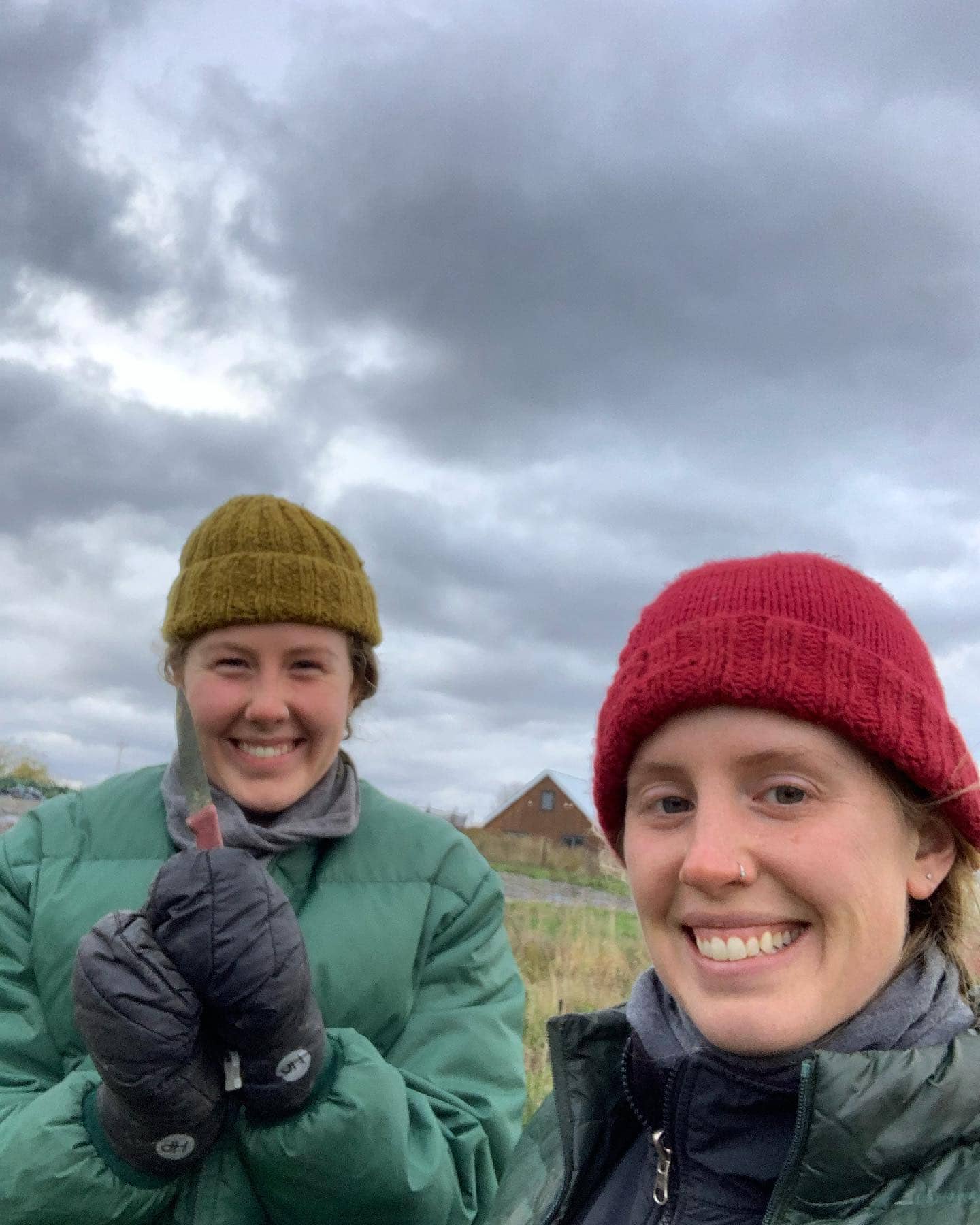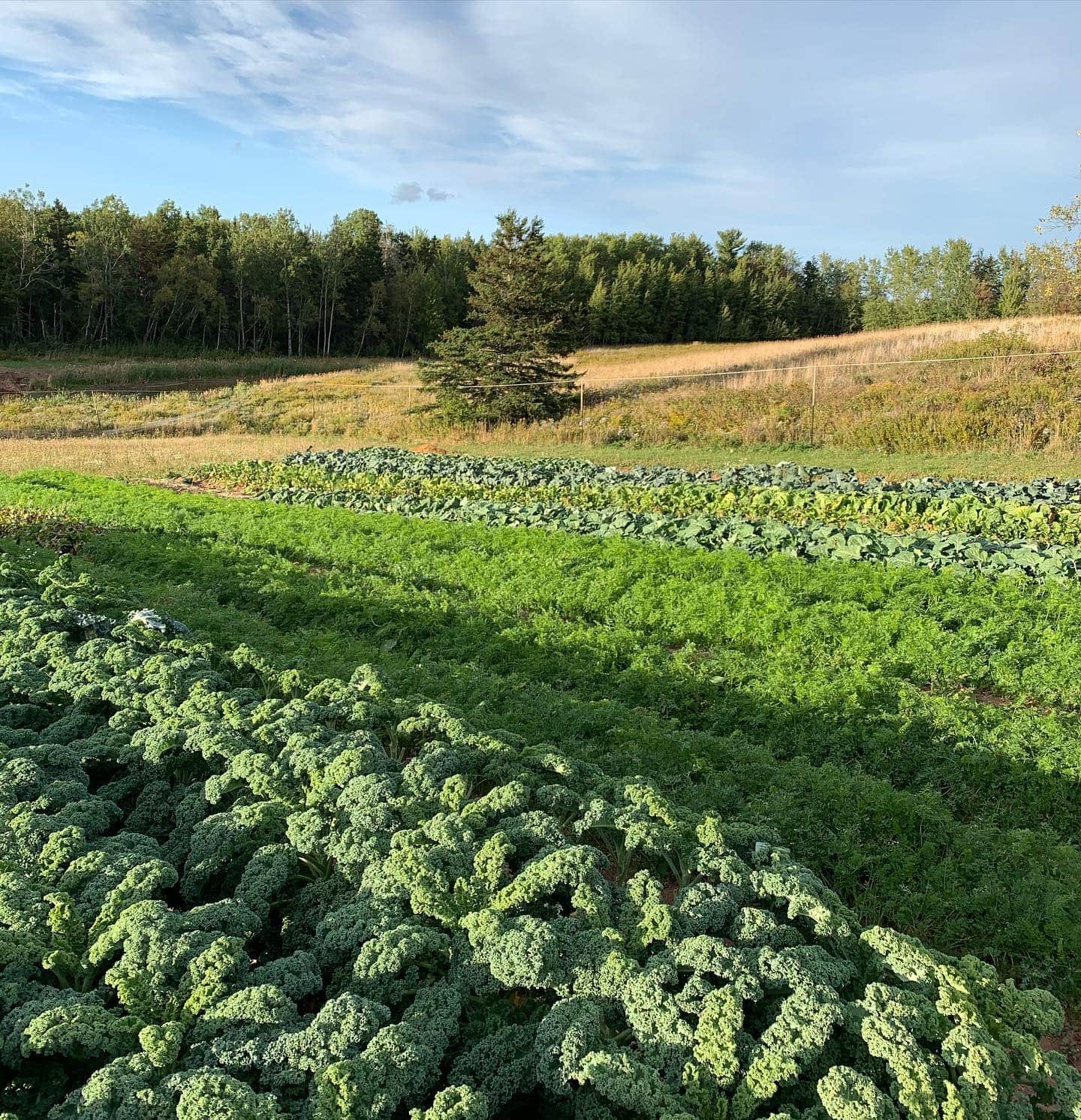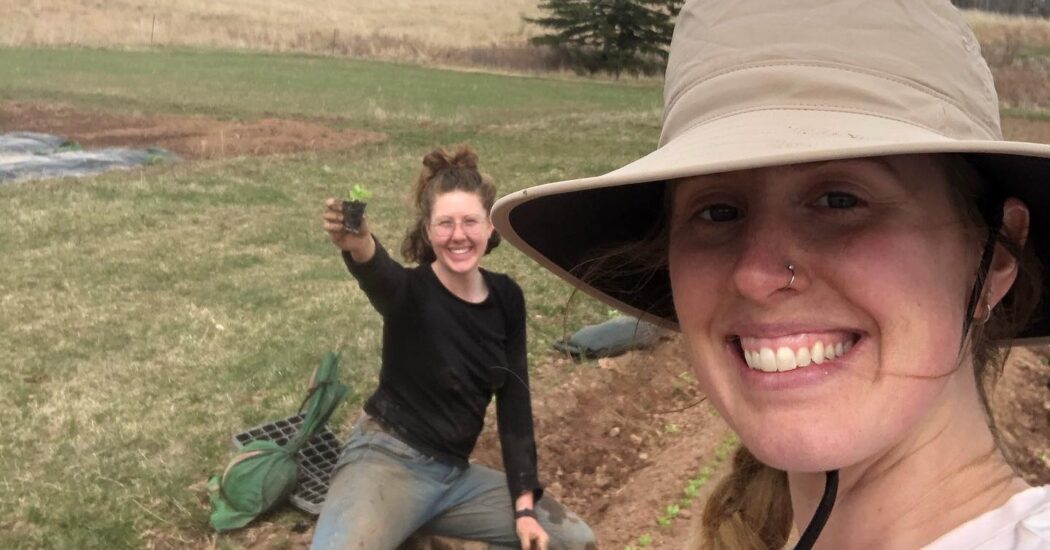
KJIPUKTUK (Halifax) – An online auction held late last year to benefit the Alton Gas water protectors raised over $12,000. One of the items on the auction block was an 18-week community supported agriculture (CSA) share full of produce, which went for $600. The item was donated by Spring Tide Farm. The farm grows a market garden of mixed vegetables and flowers in Lunenburg County and is run by sisters Jessie and Rebecca MacInnis.
Reporter Paul Wartman spoke with Jessie and Rebecca about the reasons behind their support for the auction and the connection between settler farmers, land, and Indigenous sovereignty.
Paul: How did you two decide to donate vegetables to this particular auction?
Jessie: I thought that donating a share was a good way to encourage would-be CSA members to put their money towards a worthy cause, and in a way that can be our small contribution to a cause that is vital to everyone in Mi’kma’ki. So many of the issues that the water protectors are fighting for are so close to food sovereignty, which we definitely believe. As small farmers we are trying to fight for a more just, democratic food system.
With so much of the issues that were going on with the fishery this summer and racism, and all the ongoing projects that are threatening various rivers and bodies of water across Mi’kma’ki, that it’s super important that we show solidarity in whatever way we can.
As farmers who are just getting started it’s not always easy to put money where our mouth is because we don’t have that much money. Being able to contribute vegetables to something that we so strongly believe in was an easy choice. We have lots of vegetables and we’re happy to share them.
Paul: When you could have purchased new equipment or paid yourselves more, especially when just starting out as a new farm business, why donate your hard work and money?
Jessie: If we are growing a farm in line with food sovereignty and agroecology then Indigenous solidarity is part of the business we want to grow, not separate from it. We also know that a lot of folks who buy into our CSA share come from economic circumstances that allow them to pay larger sums of money upfront, so this helps to educate and grow with our CSA customers. It’s a good way to share information and to encourage folks who support us and the causes we believe in to make donations when we monetarily can’t.
Rebecca: Yeah, absolutely, and it’s central to the direction of our business to be able show solidarity with struggles taking place across Mi’kma’ki. With the privilege that we have, it is important to contribute financially, to provide support, while still getting off the ground.

Paul: There’s a complicated relationship based in colonialism and white supremacy between farmers, the land, and Indigenous sovereignty, which gets many farmers defensive and hesitant to broach the subject of Indigenous solidarity. You are making it a keypoint of your farming efforts. Can you share some thoughts around this?
Jessie: We just purchased property, which I feel like we both have some moral qualms with being “landowners” on stolen land, and I think that’s something we’ll have to grapple with and perhaps come up with a solution that will allow our solidarity with First Nations in Nova Scotia to be a larger part of our farm.
What that will look like I’m not sure, but we can’t fully believe in the principles of food sovereignty if we’re also not working to give the land back and help in that struggle in any way that we can. For us as new land owners that’s something that we’re going to be constantly bringing into question: Like, how do we give access to the land? How can we share its stewardship, what would that look like? What does it mean to be a landowner in this capitalist system? How do we, in our small way, push back against its deep inequities?
Rebecca: My first thought is that while we do “own” land it still will never be our land. I’m always trying to reflect and act upon that fact. Especially for settler farmers, land is treated as a commodity. Trying to break that relationship on our own farm is a start. That includes figuring how to better share the land and what it produces, taking care of our home, making the space more accessible, and ultimately giving the land back. I still have relationship building and learning to do around how to be a better ally, but being open to discomfort is a good start. As long as I’m living and growing on stolen land, I need to be actively working to address that fact. That’s a huge part of moving our food system away from the grasp of capitalism and colonialism.
Jessie: Yeah, how do we move forward in a solidarity-based way, what are the steps that we want to take? I think that will come from being intentional about relationship building with the First Nations that we live close to and then being better allies beyond just a performative sense. Sharing food is an important act for me, so I hope we can create opportunities to share food, plants, herbs and build connections in this way.
Paul: We know that burning fossil fuels, including natural gas, is one of the largest contributors to climate change chaos. As ecological farmers, what impacts are you experiencing from climate change chaos?
Rebecca: The biggest challenge that I can only imagine will continue to worsen is issues regarding water. As we are supporting the water protectors, and with all the major projects that are happening across Mi’kma’ki that negatively impact the water, it’s imperative to remember how important it is–how water really is life. Without water we can’t grow food to feed people. We are scraping the bottom of the barrel for solutions to keep plants alive, keep ourselves and our communities thriving. So that’s definitely something we are reminding our CSA members of all of last summer, throughout the two month long drought, every single week just reminding them that we still don’t have water, we still don’t have water, and just how serious an issue it is.
We’re still privileged enough to dig another well. But there’s not always a solution that is that easy and as things continue to worsen there won’t be fixes that are that simple. I have endless respect for folks, in particular Indigenous women, showing up on the front lines to protect something that serves all of us. Our struggles are universal.
Jessie: When we were looking for farm property, number one on our list of priorities was a reliable water source and even in a place that is surrounded by water and full of lakes the quality and quantity of water is invaluable. We all need to protect water together and I think that’s why we need to educate others, inform ourselves, and support the water protectors who are on the front lines because they know that they’re doing it for everyone.
What everyone doesn’t know is the amount that they put on the line to protect the water, not just for themselves, but for future generations of everyone’s children. That kind of brings us back full circle to why we wanted to make this donation in the first place.
Although it’s tiny in the grand scheme of things, after having such a scary drought-filled summer, sending this little bit of help to those who are doing the work that we should all be doing is the smallest thing that we can do to encourage them.

Paul: How did it feel to contribute the CSA share to the auction?
Jessie: We were definitely excited, but at first I thought “oh my gosh, no one is going to bid on this”, but they did. It’s a testament to how much people also support the water protectors. I think this is the first small step in a series of much broader deeper steps that we take to support water protectors and other front line defenders in Mi’kma’ki who are working so hard to protect this environment that we all live and learn from.
Rebecca: Offering a CSA share as an item in the auction was the very first step we made in our planning for this year. We just arrived at the new farm, we had no idea what next season would look like, no idea at the beginning. Our desire to contribute to the frontline water protectors was so key to us and the way we wanted to set up our business. Contributing a basket to the auction was the first step towards building everything else. It was a nice push to allow us to get the ball rolling for next season, but most of all it’s a good reminder to always consider Indigenous solidarity and food sovereignty with every decision that we make as a business.
To continue to see how food sovereignty principles are put into action and how agroecological farms can answer Indigenous communities’ calls to action, follow Spring Tide Farm on Facebook and make sure to eat your vegetables! Rebecca and Jessie also recommend to check out www.Indigenousfoodsystems.org and La Via Campesina www.viacampesina.org.
Check out our new community calendar!
With a special thanks to our generous donors who make publication of the Nova Scotia Advocate possible.
Subscribe to the Nova Scotia Advocate weekly digest and never miss an article again. It’s free!




Bravo! This is a good example of “co-benefit”.